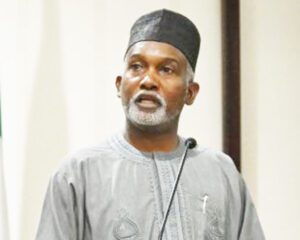
Cash scarcity: OPS criticises CBN’s limit on PoS withdrawals
The Organised Private Sector (OPS) on Wednesday expressed strong opposition to the Central Bank of Nigeria’s (CBN) decision to impose limits on withdrawals from Point-of-Sale (PoS) agents, claiming the bank is out of touch with the reality on the ground.
The CBN recently introduced a daily cash-out transaction limit of N100,000 per individual customer for PoS agents, as part of a wider effort to advance Nigeria’s cashless policy. The directive, which was issued on Wednesday, limits withdrawals for PoS transactions and is aimed at addressing issues related to fraud and promoting electronic payments.
The circular, dated December 17, 2024, and addressed to Deposit Money Banks, Microfinance Banks, Mobile Money Operators, and Super-Agents, mandates immediate compliance by all stakeholders. The CBN’s action sets a weekly withdrawal limit of N500,000 per customer, with PoS terminals restricted to N100,000 per day. It further outlines that no agent’s daily cumulative cash-out limit should exceed N1,200,000. Additionally, all transactions must be conducted through float accounts maintained by the principal financial institutions.
In an effort to enhance operational accountability, the CBN has insisted that all agent banking terminals be connected to the Payments Terminal Service Aggregator, with daily reports on transactions and float balances submitted electronically to the Nigerian Inter-Bank Settlement System. The circular also stresses that principals in agent banking operations must closely monitor transactions linked to agents’ Bank Verification Numbers to prevent unauthorised activities.
The CBN has warned that any breach of these directives will lead to penalties, including monetary fines and administrative sanctions.
However, the policy is expected to have significant implications for PoS operators and their customers, particularly in areas with limited banking infrastructure.
Dele Oye, President of the Nigerian Association of Chambers of Commerce, Industry, Mines, and Agriculture, stated that the CBN’s policies are increasingly disconnected from the realities of Nigeria’s economic situation.
Oye said, “The Central Bank of Nigeria seems completely out of touch with reality. Their monetary policies are simply not grounded in the real world. It’s hard to understand how these kinds of things happen in Nigeria and nowhere else. Their policies are so disconnected from the everyday struggles of businesses and citizens.”
He pointed out that the closure of many bank branches across the country, particularly in rural areas, compounded the problem. “How is anyone supposed to do business when most banks have reduced their branches to just a handful? For example, Standard Chartered now has only two branches in Nigeria—one large and one tiny. In some local government areas, there isn’t even a single bank branch,” Oye said. “How are people supposed to operate in such conditions?”
Further, Oye highlighted the issue of the diminished value of N100,000, which has become insufficient to cover basic living costs due to the economic challenges faced by Nigerians.
Similarly, Segun Kuti-George, National Vice President of the Nigerian Association of Small Scale Industrialists, warned that rural communities would be disproportionately affected by the new policy. In many rural areas, cash transactions remain dominant, and access to banking infrastructure is limited. “For instance, a farmer in a remote location might not have the infrastructure to accept electronic payments,” Kuti-George explained, noting that the success of the policy would depend on how effectively it addresses these challenges.
While acknowledging the long-term benefits of promoting electronic payments, Kuti-George questioned whether Nigerians were fully prepared for the transition, given the high levels of illiteracy and limited access to the necessary technology in rural areas.
The policy received some support from others, with Olusoji Oluwole, President of the Association of Senior Staff of Banks, Insurance, and Financial Institutions, praising the CBN’s decision to impose a daily limit on PoS withdrawals. He argued that the move would help restore the role of PoS operators in serving unbanked populations and areas without bank branches, in line with their original mandate.
“The policy is significant because it will ensure PoS operators return to their core responsibility of offering services to unbanked individuals and areas without bank branches,” Oluwole explained, adding that the policy would also help address problematic cash flows within the economy.
Adewale-Smatt Oyerinde, Director-General of the Nigeria Employers’ Consultative Association, also supported the policy, describing it as a step in the right direction. However, Oyerinde warned that past challenges, such as poor implementation, must be avoided for the policy to succeed.
Dr. Muda Yusuf, Director of the Centre for the Promotion of Private Enterprise, expressed concern that the ongoing cash scarcity might hinder business activities, especially in rural areas and within the informal sector. Yusuf explained that disruptions to cash flow had a negative effect on economic activity, as cash remains an essential means of payment in many parts of Nigeria.
“The major effects of the cash scarcity on business is that it slows down the velocity and the volume of business transactions, especially at the informal sector level and micro-enterprise level in our rural areas,” Yusuf cautioned.
In a related development, the Minister of Agriculture and Food Security, Mohammad Abubakar, has identified wheat production as a potential solution to Nigeria’s economic challenges. The country has set a target of producing over 2 million tonnes of wheat across 19 northern states by next year.
Abubakar, represented by his Senior Special Adviser on Food Security, Adewoye Adeyemi, spoke during an assessment of the National Agricultural Growth Scheme and Agro-Pocket Programme in Gombe State on Thursday. The initiative aims to reduce Nigeria’s reliance on wheat imports, boost exports, and support the country’s currency.
Abubakar stated, “We have no doubt that by next year (2025), we will have a bumper harvest. I believe the programme has been largely successful.” He also outlined plans to ensure year-round production, highlighting the importance of timely distribution of farming inputs. He further assured that steps were being taken to protect farmers under the programme, ensuring they receive fair compensation for their efforts.
Abubakar also pointed to transportation costs as a major factor driving up food prices and announced that Gombe State would soon have a Compressed Natural Gas (CNG) centre. He noted that the establishment of CNG centres would help address the rising cost of food by reducing transportation expenses.




